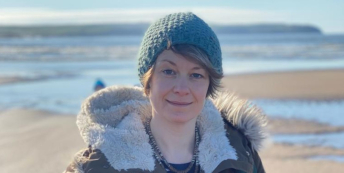“It was the only career I'd ever known. It was a hard decision to leave.”

What were you doing previously?
I was a broadcast journalist working in radio and TV.
I covered mostly sport (mainly football) and some news as well. There was quite a lot of variety.
What are you doing now?
I'm a lettings agent for the Chancellors group.
Why did you change?
I needed a change, to do something different in my life.
I wanted a clear pathway where I could I see what I could achieve. I liked the idea of going into a role knowing that if I worked hard and was good at it, that I'd be rewarded for it, as opposed to being in a role where the level of reward would never change.
My old job was exciting – no two days were the same – but I'd been doing it for 16 years. It was the only career I'd ever known. It was a hard decision to leave. But I knew that I'd probably gone as far with it as I could without uprooting my family and moving away to Manchester, where there are lots more opportunities in sports journalism, but which I wasn't prepared to do. I needed a new challenge.
I also needed more job security. I was self-employed before with no fixed contract. Earlier this year I had a health issue which meant that I needed roughly six weeks off work. Being self-employed meant I didn't get any sick pay and this was just too tough on the bank balance.
I've got two little girls to think about and I wanted to do the right thing by my family. I had to make a change.
When was the moment you decided to make the change?
I'd just found out that I didn't get a news reading job I'd gone for.
It was a job that I don't think I really wanted. It was full time and local, which would have been great, but it was in news rather than sport, which felt like a step away from what I really enjoyed. Anyway, I gave it a good go, but didn't get it. And at the interview stage it had felt like I was quite a way off getting the job, or one like it. It was a bit of a reality check.
I realised that I needed to do something about it. I needed to find a role where I could progress as a result of my hard work.
Are you happy with the change?
Yes.
Now, I go into work each day relishing the challenge. I don't take the work home with me, but I find I'm thinking about it even when I'm not at the office, and it excites me. I can see areas of growth and opportunities I can go for where I think I can really make a difference. The incentives are there too.
I'm really enjoying it.
What do you miss and what don't you miss?
I miss a few of the friendships I'd built up over the years.
I miss being involved in sport. I miss being able to spend time on social media, or interviewing footballers or managers, stuff like that.
But there were also days that dragged on and on, where I didn't have much to do. Whereas now I know that every single call I make, everything I do, is contributing towards something. It didn't feel that way before.
I love sport, but it's always been a hobby first and foremost: from playing sports when I was younger, to going to sports events as a spectator as I grew older. Now I've started taking my oldest daughter to see her first football matches. That's the side of it that I find I'm looking forward to doing more now, instead of worrying about the work aspects of it.
I feel very privileged to have been involved in sport the way I have. However, now I just want to be a normal fan now, who can say what he wants on social media instead of wondering whether it's being scrutinised.
I don't miss the lack of benefits that come with being self-employed. When our first child was born I had no real time off to spend at home. Now, we've just had our second child and, while I haven't been in the role long enough to qualify for paternity leave, I have been able to take some paid holiday in order to have some family time. That's been a huge benefit!
How did you go about making the shift?
I'd been thinking about it for a while, but there was a particular day when it all clicked into place.
I was sat in a cafe with my mum. We were in the middle of a town where there were quite a few estate agents. There was a bit of a magic moment, where mum said she'd always seen me doing something like being an estate agent. And I said I'd been thinking exactly the same thing.
So I went into one of the estate agents that day and asked them about working there. That got the ball rolling. They didn't have any posts available in that branch, but it turned out the wider company was recruiting. I applied for a role soon after and got it.
I had a friend who'd set up his own business as an estate agent. I knew from him that if you're the sort of person who's happy speaking to people and can do so in a way that shows you know what you're talking about, then that's a great foundation for working in the industry. That's one of the things that led me towards wanting to do it.
I liked the idea of having the opportunity to meet people, to go out and speak to them in their homes and to build relationships with them. That bit is very similar to journalism in many ways, in terms of relating with people you've never met before. I knew that that part of it wouldn't faze me.
Getting to know the industry in terms of how it actually works has been a bit of a different matter. There are certain areas that you have to be very sure of, but that's where good training comes into it. That's another reason I liked the industry; I knew it was something I could go into without having to have another qualification – you can learn on the job. Sometimes it seems like there aren't many jobs around these days where you can do that!
I've bought and sold a couple of houses in the past and although it was stressful it was really interesting. I'm not massively into finance or investment, that kind of thing, but I am really interested in the reasons why people move, what they're looking for, and putting two and two together to (hopefully) help them find their ideal place. The journalism skills really help there: being aware of the individual you're speaking to and the fact that sometimes you have to draw out of them what they're really looking for.
What didn't go well? What 'wrong turns' did you take?
Going into the industry at 32 has been a challenge.
It's generally viewed as a young person's industry, and I'm the oldest person doing what I'm doing in the office. Management are a little bit older, but not much.
Then again, I'm in a different place to a typical 21 year old coming into the industry. I've got a family to prioritise and I'm motivated by that. With my maturity and relative experience, there's definitely an opportunity to 'fast track'.
How did you handle your finances to make your change possible?
I was fairly lucky in that respect.
In the old role I wasn't in a situation where I was living hand to mouth. So, even during the transition I still had money coming in from work I'd already done. There were a couple of weeks where there was a bit of a lull, but then I got my first pay packet.
In that respect the shift was relatively stress free, which I feel very grateful for as I know many don't have that luxury! I guess that's one of the benefits of going from self-employed to employed work.
What was the most difficult thing about changing?
I think it was probably getting comfortable with the fact that I was essentially going to become a salesman.
The approach that I use, and the ethos of the company I work for, is not about being sales focused. I definitely don't want to come across as a pushy salesman!
So, reconciling the role I was stepping into, with how I (and the company) wanted to go about it, was definitely something I had to overcome.
To do that, I've had to try things out, and a few times I've got the balance wrong, been too sales-y and been pulled up because of it. I'm glad, because some of those things I was doing because I thought I had to in order to do the job, even though they didn't feel that good or natural. It's been a case of trial and error. That process of correction was actually a relief, and since then it's all felt much more positive.
What help did you get? 
I had a couple of friends I already knew in the industry who I spoke to about what it was all like. They certainly helped.
I also had another conversation with a woman who'd approached me about another job. She'd been an estate agent and she helped me by telling me about the parts of the role that an outsider wouldn't otherwise know about.
At home the support was great too. My family could see that the role was absolutely ideal and exactly what I needed – they were behind me 100%.
What resources would you recommend to others?
The most useful resources for me were people – conversations that gave me the inside track, and taught me what to expect from the industry.
So, I'd recommend putting out feelers in your personal networks for people who you could talk to about the line of work you're interested in.
Chances are that you have a friend, or that one of your friends has a friend, who is connected to the field you want to get into. Make the most of them!
What have you learnt in the process?
I've learnt that it's important to go with my instincts.
I had to trust that it was the right time to leave and do something different. And I had to then make it happen.
And I learned that speaking to people was the way to sort out the things I was worried about. It's important to find people who can help you out in that process.
What would you advise others to do in the same situation?
Go with your heart.
You don't have to do the first thing that comes up.
If you're unhappy at work, it doesn't matter how much you earn, your home life is still going to bear the brunt of that negativity. Whereas if you're happy at work, then it spills over into home in a good way. That's worth it and the right move to make, even if you have to take a backwards step in income for a while.
What lessons could you take from Daniel's story to use in your own career change? Let us know in the comments below.



